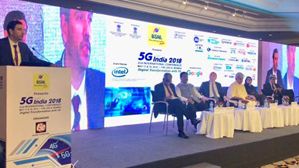Minister,
Secretary,
Deputy Secretary-General of ITU,
Ladies and gentlemen,

As chairman of Arcep, the French Telecom regulator, it is a great honour to be here, not only in the leading country for mobile data, but also in the world's largest democracy, to exchange on the future of mobile technologies.
Last year, I was actually also the Chairman of Berec, the body of European regulators. The steering committee of Berec organize every year a study trip. Last year we decided to go to India, and we have not been disappointed. The telecom Indian market is really fascinating, with a very fast moving landscape and worldwide players. And something stroke me also: the fact that Indian digital policies are designed as a whole, from telecom infrastructures to hardware components, identification system and startups ecosystem. Very inspiring, and at some point comparable to our Digital Single Market European strategy.
India and Europe have a lot in common. I love to consider ourselves as the two biggest democracies in the world. Maybe being the reason why, together, with my Indian counterparts, we share so much when it deals with open Internet. Some other places in the world seem to hesitate on net neutrality, putting in place rules and afterwards withdrawing them, again and again for more than ten years. You know who I am thinking at. Keeping the internet open to any expression, to any innovation, will become, believe me, a new standard in any proper democracy; and I am happy to see India and Europe at the forefront of this ambition.
But let's face it: democracies are sometimes weak, if not naive. Being open and fair, when other places in the world are not (so much), can be a real challenge. When it deals with digital, we may ask ourselves whether democracies can be truly sustainable without technological sovereignty? In other words: is it reasonable to convert our whole societies and economies to digital (all communications, access to contents and knowledge, e-commerce, e-government, e-education, e-health, etc.) without controlling the main technological bricks of the underlying digital ecosystem?

In this regard, 5G will be a critical rendezvous. 5G is different from 2G-3G-4G. Is it not only about telecom. It is a technology tailored for industrial uses before than being addressed to consumers. On what our countries will do with 5G, will depend the future of our cars and roads, our railways, our energy networks, our ports, airports and logistic sector, our heavy industries, and so on.
And there are two sides of the coin here: one is competitiveness and the other is sovereignty. On the first side: we all have to go fast on 5G, because, for a country, lagging behind on 5G would damage the whole competitiveness of its economy. This is the big issue of the moment. But there is another side: if we don't pay attention to technical sovereignty, we risk to progressively lose control on all our infrastructures and businesses, not only on telecom.
On the first side (speed of 5G rollout), we all are competing with each other. Every country wants to be "the sexiest 5G place in the world". And Europe is very much committed, with a global review of the European telecom framework launched in 2016, with a clear spectrum strategy, with ambitious Gigabit society objectives to have one city with 5G in any European country by 2020, and global coverage all over the continent by 2025. And France is committed too, with several real scale pilots that will be announced in the coming weeks (in ports, plants, roads, etc.) and launched beginning of 2019. And I will be happy to hear today of India's commitment too.
But let us not forget the other side of the coin: sovereignty. What about sovereignty with 5G suppliers? with 5G applications? with the data collected and the algorithms used? This is a key topic too. And here, India and Europe are not only competitors. I would say, in the contrary, we should cooperate more. Together, we will be stronger to make sure that our democracies are relying on a sufficient level of technological sovereignty.
Thank you for your attention.
